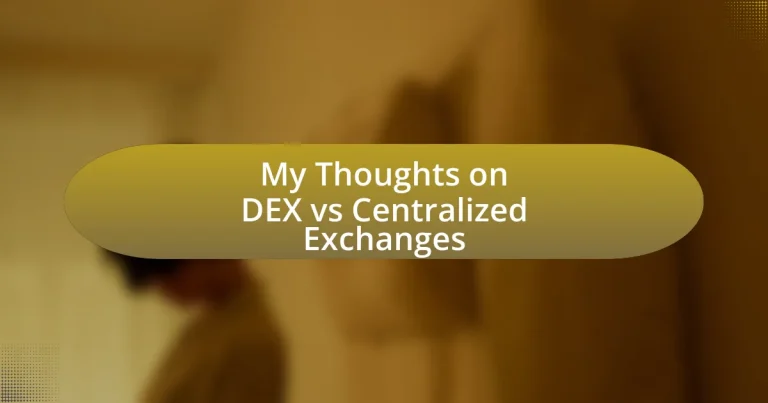Key takeaways:
- Decentralized exchanges (DEX) offer privacy, control over assets, and a wider variety of tokens, but face risks like smart contract vulnerabilities and lower liquidity.
- Centralized exchanges provide user-friendly interfaces, robust customer support, and higher liquidity but are susceptible to hacking and lack transparency.
- Choosing an exchange involves weighing security features, transparency, and regulatory compliance to ensure a safe trading experience.
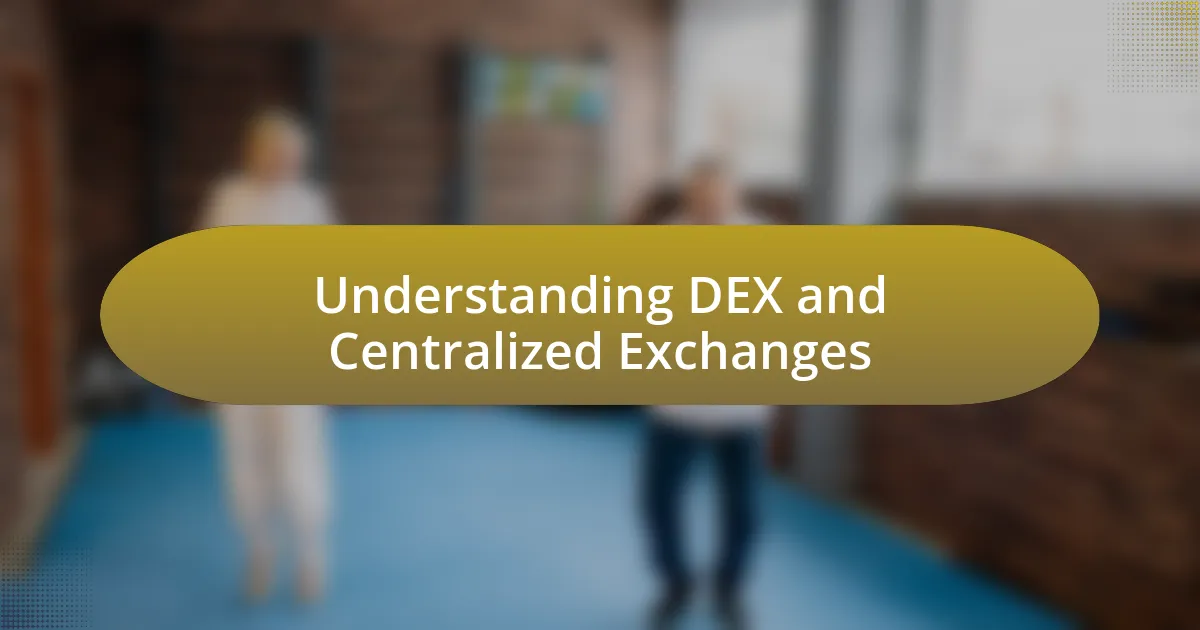
Understanding DEX and Centralized Exchanges
Decentralized exchanges (DEX) operate without a central authority, allowing users to trade directly with one another. I remember my first experience trading on a DEX; it felt liberating not to depend on a third party. I could see my trades happening in real-time, and the control I had over my assets was empowering.
On the other hand, centralized exchanges act as intermediaries, managing transactions and holding user funds. I’ve found that they often provide a more user-friendly interface, which can be appealing for newcomers. However, I can’t help but feel a sense of vulnerability when my funds aren’t in my hands. Isn’t it a bit unnerving to trust a platform to safeguard your investments?
Both types of exchanges have their merits, but it’s crucial to recognize the trade-offs. While DEXs offer privacy and control, centralized platforms often provide higher liquidity and faster transactions. Reflecting on my experiences, I’ve learned that choosing between them depends not just on the features, but also on what kind of trader I want to be. Are you focused more on security or convenience?

Benefits of Using DEX Platforms
In using DEX platforms, one of the standout benefits is enhanced privacy. I remember the first time I made a trade without providing my personal information; it felt incredibly refreshing to engage in transactions without fear of oversharing. This level of anonymity is often absent in centralized exchanges, where identity verification can feel quite intrusive.
Another significant advantage lies in control over assets. On a DEX, I always felt a heightened sense of security knowing that my funds weren’t languishing on an exchange, vulnerable to hacks. When I traded directly from my wallet, I could sleep better at night, trusting that I was the sole custodian of my assets—something that’s hard to replicate in centralized environments.
Lastly, DEXs typically offer a wider range of tokens. This opens the door to exploring innovative projects that major exchanges may overlook. I vividly remember stumbling upon a niche cryptocurrency that wasn’t available anywhere else, and DEX was my only route to scoop it up. It was exhilarating to participate in a burgeoning ecosystem, forming connections with like-minded traders drawn to the same hidden gems.
| Benefits of DEXs | Description |
|---|---|
| Privacy | Users can trade without revealing personal information. |
| Control | Users maintain custody of their assets at all times. |
| Variety | Offers a wider selection of tokens and projects. |
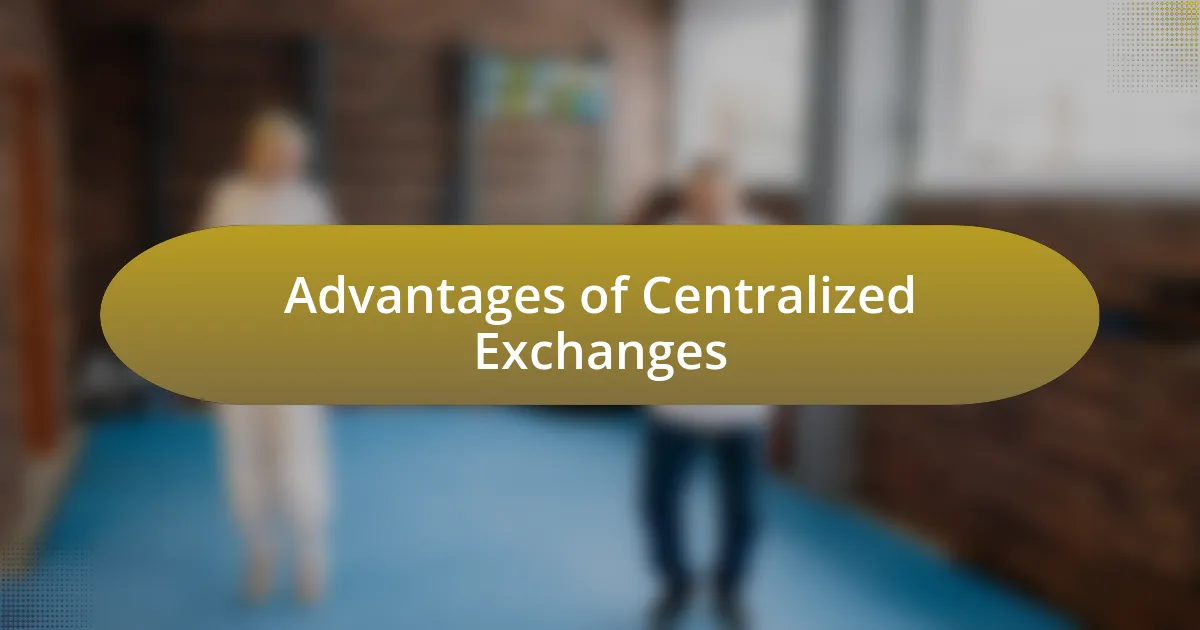
Advantages of Centralized Exchanges
When considering the advantages of centralized exchanges, one striking benefit is the ease of use. For someone new to cryptocurrency, I recall how intuitive and user-friendly my first centralized exchange experience was. Navigating the platform felt like a breeze, making it simple to buy and sell assets without diving deep into the complexities of blockchain technology. This accessibility is particularly valuable for those who may find decentralized exchanges overwhelming.
Another advantage lies in the robust customer support that centralized exchanges often provide. I remember encountering an issue with a transaction, and the response from customer support was almost immediate. Having a dedicated team to resolve problems gives a sense of security and trust that can be comforting, especially when dealing with significant amounts of money.
- User Experience: Centralized exchanges typically offer streamlined interfaces, making trading easy for beginners.
- Customer Support: Users can access dedicated support teams for assistance with transactions or issues.
- Liquidity: Centralized exchanges often have higher trading volumes, which can lead to better prices and quicker trades.
- Regulatory Compliance: These exchanges usually adhere to local laws, providing users with a layer of protection and accountability.
- Fewer Limits on Transactions: Centralized exchanges often have fewer restrictions on the size and frequency of trades compared to decentralized platforms.
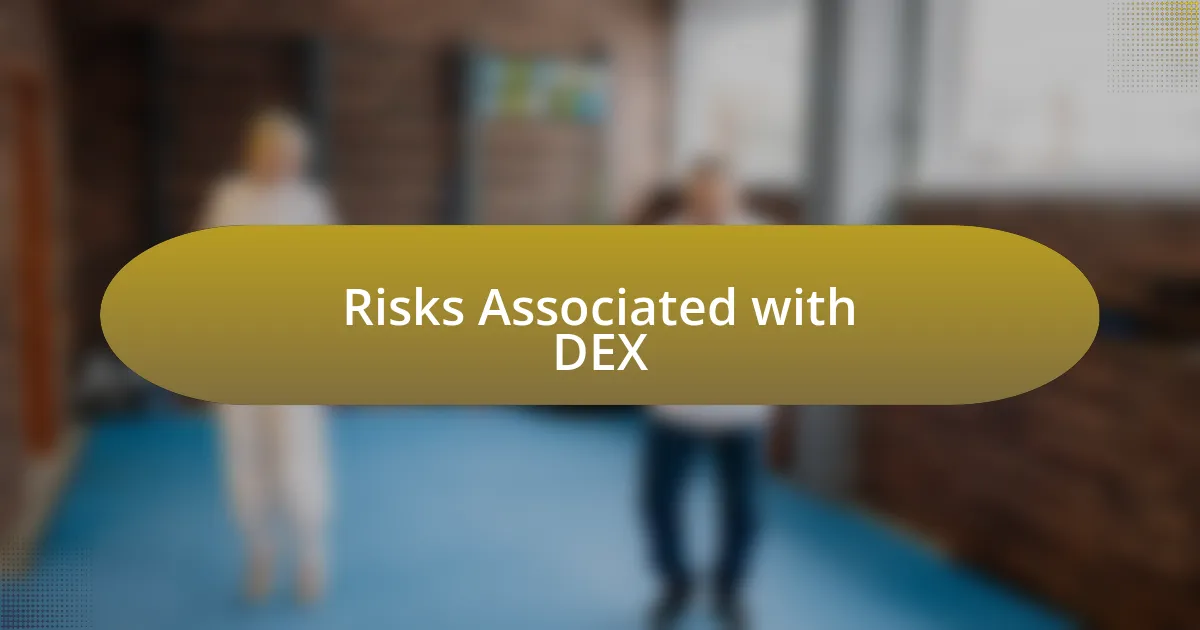
Risks Associated with DEX
While decentralized exchanges (DEX) offer privacy and autonomy, they come with their share of risks. One major concern is the potential for smart contract vulnerabilities. I’ve seen stories where users thought they were trading securely, only to lose their funds due to a flaw in the underlying code. It’s shocking to think that one line of code can put your investment at risk.
Another risk I often reflect upon is the lack of customer support on DEX platforms. When I first tried using one, I encountered a problem that left me feeling frustrated and helpless. Unlike centralized exchanges, where support is just a message away, DEX users typically have to rely on community forums or documentation, which can feel overwhelming, especially for newcomers. How do you navigate an issue when the help isn’t readily available?
Liquidity is also a significant concern. When I wanted to execute a trade on a DEX, I sometimes found it challenging to find buyers or sellers, especially for lesser-known tokens. This lack of liquidity can lead to larger price swings and an overall less favorable trading environment, making me question whether it was worth venturing into these platforms in the first place.
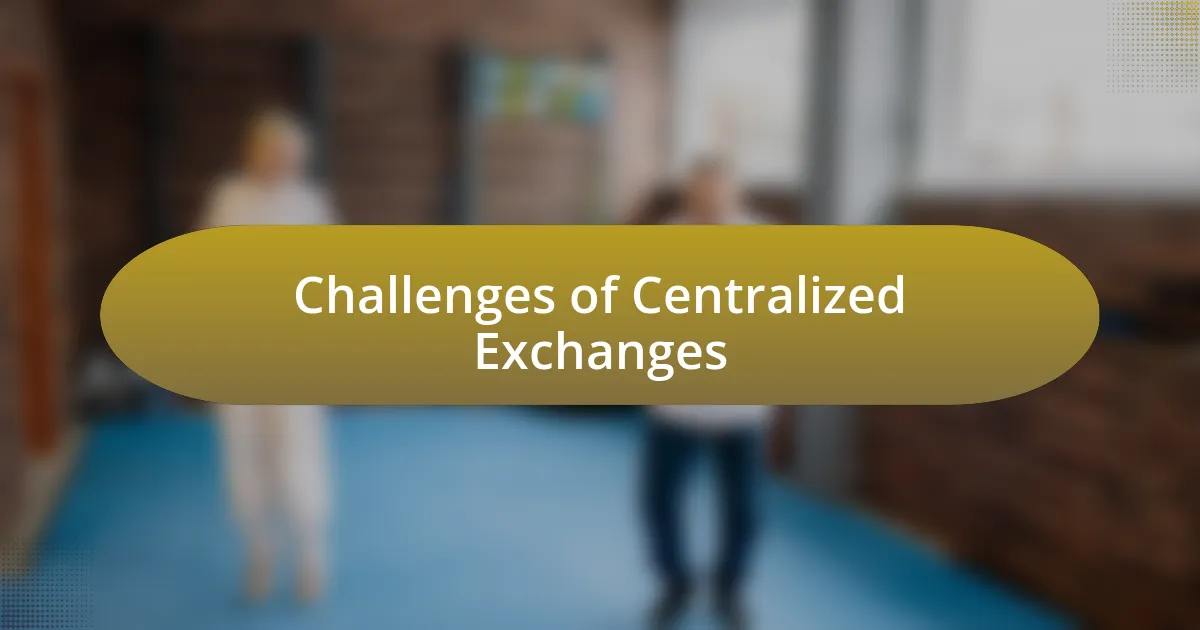
Challenges of Centralized Exchanges
Centralized exchanges, while user-friendly, face significant challenges that can impact user experience and security. One major issue is the risk of hacking. I remember the anxiety I felt when a major exchange I trusted reported a security breach. Hearing stories of users losing their funds due to inadequate security measures left me wondering if my investments were truly safe.
Another critical challenge is the lack of transparency in these platforms’ operations. It can be disconcerting to realize that you have limited insight into how your assets are being managed. For me, it often raised questions about where my money really sits and how it’s being used. Can we really trust someone else to handle our assets without understanding the process?
Additionally, regulatory compliance can pose significant hurdles. These exchanges must adhere to continuously evolving laws, which can lead to sudden changes in policies or even the potential for closure. I recall feeling uneasy when a platform I used abruptly announced restrictions on services due to regulatory pressures. It made me question if my funds were at risk of being locked away when I needed them most.
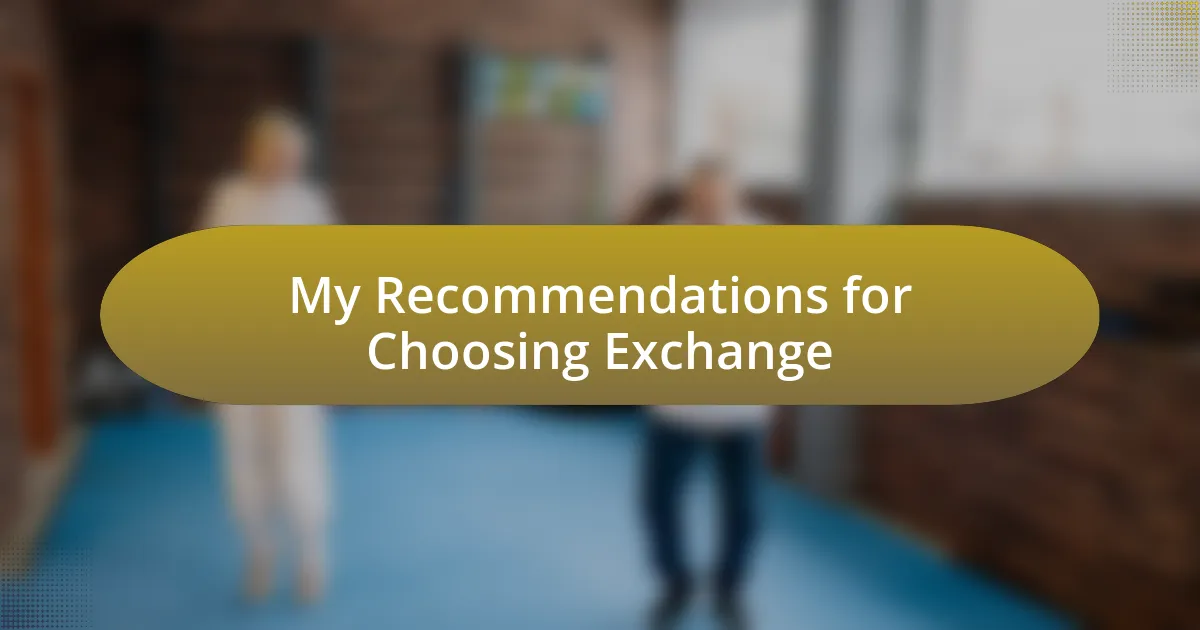
My Recommendations for Choosing Exchange
When selecting an exchange, I always recommend considering the security features they offer. After experiencing a significant downturn in trust following a hacking incident with a popular centralized exchange, I became more discerning. I now look for exchanges that offer two-factor authentication, cold storage, and regular security audits. Do these features make a difference? Absolutely, because knowing there are layers of protection helps me sleep better at night.
Another factor that weighs heavily in my decision is the exchange’s transparency. I recall a time when I didn’t fully understand where my funds were going on an exchange, which left me feeling uneasy. Nowadays, I prioritize platforms that provide clear information about how they operate and manage assets. I believe that transparency doesn’t just foster trust; it empowers users to make informed decisions, enhancing the overall experience.
Lastly, keep an eye on the regulatory landscape of an exchange. I’ve seen exchanges stumble because of sudden regulatory changes, leaving users like myself in limbo regarding their assets. Choosing a platform that proactively communicates about compliance and adapts to regulation can save you a lot of stress down the line. How often do we consider the broader implications of regulation when making our choices? I find that being informed goes hand in hand with feeling secure in my trading activities.

